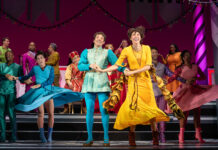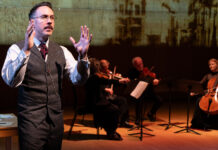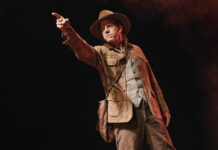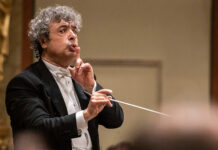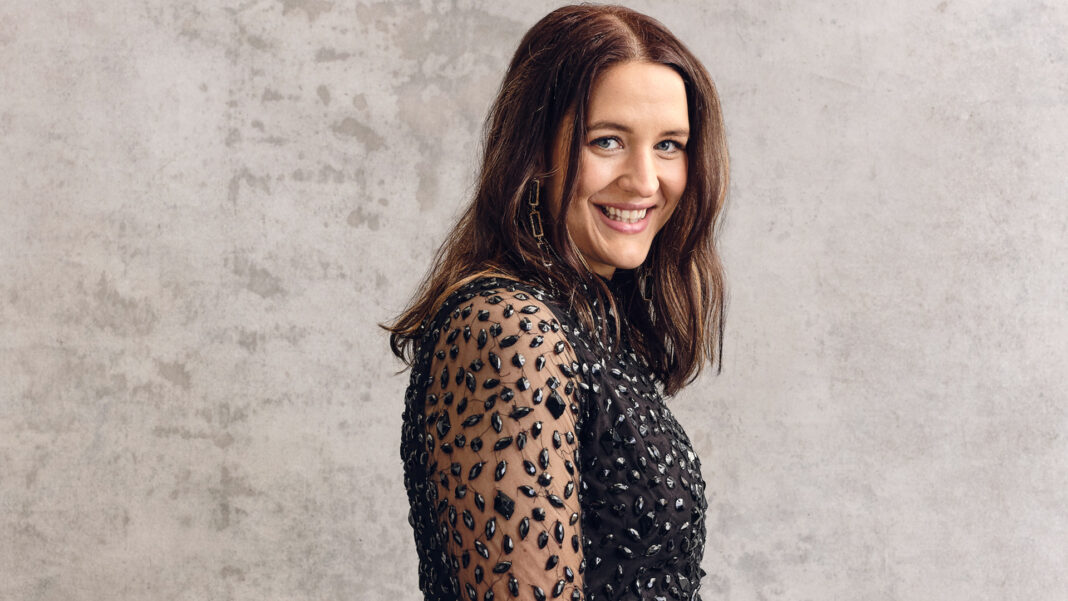When Peter Gelb, the General Manager of the Metropolitan Opera, offers someone the metaphorical keys to the Met, patrons and audiences pay attention. So, too, does the recipient. In this case the lucky person is soprano Lise Davidsen.
The Norwegian singer made her debut at The Met in a 2019 production of Tchaikovsky’s The Queen of Spades. She’s also appeared there in the operas Ariadne auf Naxos (which I saw and was astounded by her performance), Elektra and Die Meistersinger von Nürnberg. This season she will appear in Verdi’s La Forza del Destino.
Before that happens she will be one of just a few select artists to give a recital at those hallowed halls at Lincoln Center on Thursday, September 14th. She will also perform a recital at the BroadStage in Santa Monica on September 17th. Pianist James Bailieu will accompany her at both concerts.
Last month I spoke with Davidsen about her approach to recitals, how the world has changed for opera singers and the responsibility of accepting those keys that Gelb has offered her. What follows are excerpts from our conversation that have been edited for length and clarity.
Q: You told Jeff Linden of PBS’s Morning Edition last year that you realized it would be easier for you to take on roles because you didn’t have to be yourself. Essentially that you just could be the character and some of your fear went away. In a recital you don’t get that opportunity unless you create a world where you are a persona apart from yourself. So how do you approach recitals?
It’s a very good question because you don’t have the props, the sets, the dresses. You don’t have the other colleagues. So there’s a lot of information and role characteristic things that are not there. But I do think that I have created my world for each number that I do. Each aria, each song, there is sort of a little world that is my world. My hope is that some of it will go to you as an audience member. Maybe you know the song, maybe don’t know the song, maybe you will get completely different pictures. But there’s room for us to explore all these smaller songs – smaller in terms of length rather than a three-hour opera.
When you were accepting your Opera News Award earlier this year, you talked about how music allows you to express yourself in ways that words could not. What does a recital and the repertoire that you choose to perform tell us about who you are?
In recital I’ll talk in between to present the songs. So I think already there the audience gets to know a bit more of me. I will bring some Grieg songs, some Sibelius to these recitals. There’s a different part of me than when you hear an Ariadne or Tannhäuser or a Verdi. It’s something else you get to know. The bigger arias that will be where people think obviously this is the Lise we’ve heard before. So I think it’s presenting different sides of me or different parts of what I do, rather than sharing the main emotion in a way.
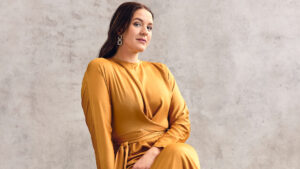
But is there part of of putting the repertoire together for a recital that you think not only does this music speak to each other, but this helps me tell a story about who I am at this moment as I’m performing?
I think there is an aspect. The BroadStage and the Met concert [are] both a mix. There are certain arias that I would like to do because I think about the space and the piano. You have to think about that as well. The pianist is lost with these long chords that don’t really sustain in a piano. Then there’s how we build it up, what what suits each other, what’s a good contrast in all of this. I always think, what can I bring that they haven’t heard before? What can I bring that it will be a surprise? All of these things have to be taken in.
I saw a video where you performed I Could Have Danced All Night from My Fair Lady, which I think a lot of people would be surprised to hear you singing. What inspires a choice like that?
That is a simple inspiration because it is about what can I do to lighten my repertoire? My opera roles are filled with drama. There is not so much operetta in my repertoire. I think the audience, when they hear that in a concert, it is to sort of clear the air a bit like, oh what a light little tune or fun maybe. Also, I think we need that. We need something to sort of clear it up a bit before we dig into something even more serious.
When Peter Gelb says, “Every major dramatic soprano role that she wants to do is hers as far as I’m concerned” and offers you the keys to the Met, that’s pretty heady to be told at any point in one’s career. What kind of pressure do you feel when when the head of a Met is saying such glorious things about you?
One part is unbelievably overwhelming. It’s big, big, big words. It’s a responsibility I’m not sure I can carry. But on the other hand, it’s a responsibility I would like to carry. It’s a job that I would like to have because I really love being at the Met. So if those two things can come together, then it’s kind of the perfect match. Both him and me can only see what the future holds in a way and plan accordingly.
You have so much attention on you right now which gives you tremendous opportunities. Given that a lot of people describe the time we’re living in now is a golden age for new opera, how much do new contemporary works interest you as you move forward in your career?
It interests to me quite a lot. But in terms of what I feel I can do, I still focus on the more classical, ultra-traditional operas, because I do believe I have a voice that suits that repertoire. That said, I do believe that when I’ve sort of settled some of these roles, then I hope I’ll get to do modern opera and work with a composer because it must be amazing to do a whole new opera that is made for you in your time. There’s a completely different way of communicating with the composer. You don’t have to say, Why did you write this? It means you can actually go and ask and I think that is amazing.
Is there an opera that you have so many questions that you would love to have a chance to talk to the composer? Would you like to talk to Wagner before tackling Tristan und Isolde if that were possible?
I think I’ve always liked to have a chat with them. I think the thing is both Wagner and Strauss are very specific in their writing. I think Verdi is even more interesting because there’s so much tradition. There’s so much this is how it used to be done and we don’t really know how much truth there is in that. Sometimes I wonder if they do this, why do they do it?
Renata Scotto just passed away. In 1978 she did an interview with the New York Times and she said, “I have two Renata Scottos, one working and one private. The private one doesn’t remember the artist because I really need to relax my head and have fun.” That was nearly 45 years ago. Does being an opera singer today require that same duality?
I think that is the same. It’s just in a different way than it was for her. I think in today’s time we are even more exposed to our audience. With social media we’re connected in a completely different way, and that has its pros and cons. It’s brilliant because I can communicate with people on the other side of the world. I can get messages from people. I can give advice to young singers. There are so many good things, but I think it also requires an even stricter strategy in how to protect yourself. It’s all out there and how much do you want to be out there, How much do you want to be private or personal? And I think that is a balance I worked a lot on to find and I still do.
In 1960, another Norwegian soprano, Kirsten Flagstad got a star on the Walk of Fame in Hollywood. Most people today probably walk around or walk on her star and have no idea who she is because opera isn’t embraced in 2023 the way it was in 1960. Do you think it would be good if if opera was embraced the way it was in 1960? Do you think that’s even remotely possible?
I have no idea if it’s possible. I think the world has so much to offer right now. We have so many paintings and art forms available to us that to go back and be such a high percentage of what people used to do, I think is really, really hard. I don’t know if I’m naive, but I really hope that there will be a time where [there] will be even more people listening to opera. If we can manage to open our doors a bit more and make sure that it’s reachable for everyone, that is my number one wish for this art form.
I come from a house where we didn’t know what opera was, but we thought it was not for us. We didn’t listen to it. True to my education, to my work, my family now goes to opera and they say they love it. There’s a completely different way of listening. In a time where we search for yoga or mindfulness or meditation, I want to say, “Hey, we’re already there. Just come in.”
There’s so much to look at. There’s so much to take in. Turn your phone off. When we let go of the fact that we have to know everything all the time, that’s when we are able to take in new experiences. That’s what I’ve said to friends or family that don’t normally go to the opera. It’s okay if you’re bored for a couple of minutes. You can look at those sets. You can look at an orchestra of 100 people that are playing. And we’re all there for you. There’s so many things. Eventually you will know more and, maybe as an audience member, demand more. Lean back and let the music speak.
If there was anything about this time in your life, in your career, that you would like to bottle up and have as a reminder 15, 20, 25 years from now, what do you think it would be?
It will be the fact that I have so many wonderful audience members that come to my concerts. The fact that people travel to see me sing. I wish I can sort of take that in, not just in a bottle, but, I wish I understood that because it’s pretty surreal.
Why?
I don’t know. Can’t you find someone where you are? I don’t really grasp that. But of course, I travel to see people, too. So it’s not really connected. If I zoom out, I can say,” Oh, how about that repertoire? You like that?” Then you travel to do it. But when people come from Australia to hear you, that is for me. There’s so much love in that and I wish I could take that in and keep that because it’s this dedication beyond. It’s really, really impressive.
Both photos of Lise Davidsen ©James Hole/Courtesy BroadStage


